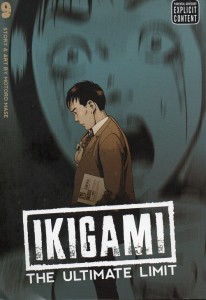Manga Review: Ikigami: The Ultimate Limit by Motoro Mase
In an alternate-history Japan, the government immunizes all children as they enter first grade. But one in every thousand injection also contains a nanocapsule that lodges in the child’s heart. and somewhere between age 18 and 24, will activate and stop that heart. There’s a triple-blind system in place to prevent anyone from knowing just which injections contain the lethal capsules.
But just before the capsule is due to detonate, the name of the person is revealed to a government agency that delivers death notices known as ikigami to the victim twenty-four hours in advance. One such deliveryman is a bureaucrat named Kengo Fujimoto.
The frame story follows Fujimoto as he joins the Ministry, gets his basic training, and delivers the ikigami. He’s a bland character, which is deliberate. He’s drifted through his early life without any particular direction, and wound up in this job more or less through inertia. Each volume covers two deliveries.
This is where most of the action is, as the actual stories are asking the question, “What would you do if you only have twenty-four hours to live?” The answers are as different as the victims, who range from brilliant creative types who had their whole future ahead of them through average kids to criminals with nothing left to lose. There is, of course, a part of the law that punishes your family if you take the opportunity to go on a crime spree, but not everyone is deterred by that.
In the volume at hand, #9, the cases are:
“National Welfare Immunization” A young woman who became a nurse specializing in neonatal care because she was born prematurely and had to struggle for life, discovers that she is one of the Chosen. She infiltrates a school where the children are being immunized, and takes one hostage so she can confront their parents about the unfairness of the system. The doctor doing the immunizations is dealing with his own guilt, as he had personally injected one of the Chosen at the beginning of his career and was his personal physician for years. Can the situation be defused with only one death?
“Two Fallen In War” Many years ago, two men met in World War Two, and a series of incidents bound them together. Now, are those same circumstances repeating with their grandsons? Questions of fate and intention intertwine. Surprisingly, incontinence is a key point.
In the frame story, war threatens, and the Thought Bureau is finally concluding their investigation. Fujimoto must finally confront his misgivings about the National Prosperity Law and the injustice inherent in the system. He makes a decision, but what will that decision be?
One of the interesting aspects of the series is that other than the dystopian aspects, the alternate Japan’s culture is virtually identical to our world’s, with the same social ills and crime rate. In other words, the supposed benefits of the ikigami system are in fact pointless.
This series is marketed to the seinen (young men) demographic in Japan and has some intense violent scenes and generally mature readers subject matter. One chapter contains an attempted rape. Parents should heed the “mature readers” label.
Many of the cases presented are tear-jerkers, and intensely dramatic. The art style is suited for the subject matter. The final volume is due out in August 2014, but tentatively I recommend this series for fans of dramatic fiction.


Oh goodness – another fascinating story line. You keep adding to my reading list – now if only you could add more hours to my day. 🙂
Keep watching…I’m bound to hit a book on efficiency or time management eventually.
I love how the Japanese anime always have such interesting and intellectually challenging material. I think I like the Rinne one better though!
They have a lot of dreck too, but I tend not to bother reading or watching the worst stuff. So there is a filter effect. (Just like in English Lit class, you never cover the vast amount of dreadful Eighteenth Century potboilers, only the handful of good books.)